Review: Orlando Shakes Draws Swords and Laughs with THE THREE MUSKETEERS
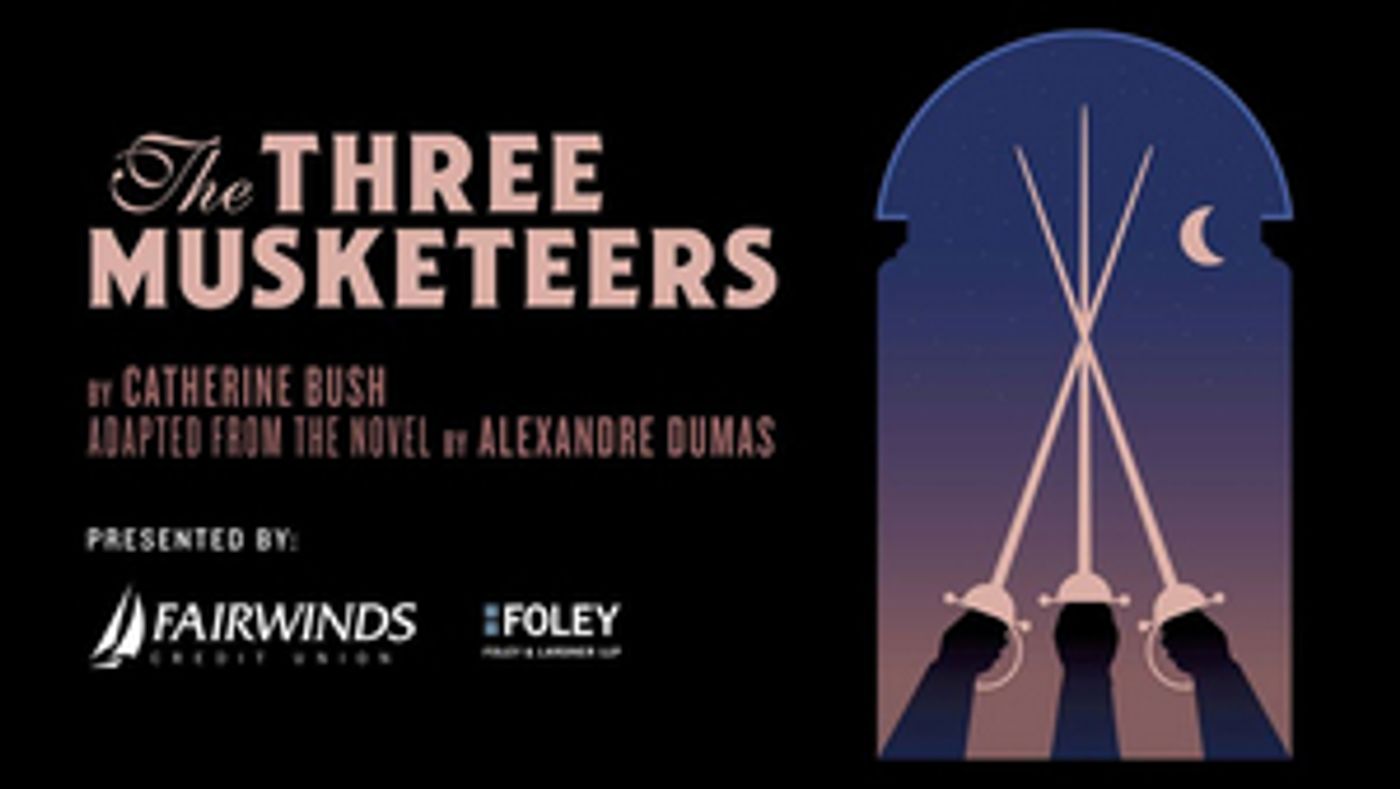
Ask anyone to describe the Three Musketeers, and you'll get the usual answers: three heroes, bound together in brotherhood, inseparable in the most dire circumstances. They were a holy trinity of masculinity and friendship, the #SquadGoals of the 19th century. But unless one were intimately familiar with Alexandre Dumas' novel or its many adaptations, five will get you ten the average Joe today would be remiss to actually name all of them. That's not the fault of the average Joe, but rather the reputation that precedes these fictional characters. Most would be familiar with what they are, not necessarily who they are.
This, unfortunately, has been the result of poor treatment of The Three Musketeers in recent pop culture history. The last cinematic adaptation, a 2011 steampunk fantasy, was a guilty-pleasure embarrassment that traded character development for 3D zeppelin battles. Nearly twenty years earlier, Walt Disney Pictures revised the narrative far beyond what traditional Three Musketeers adaptations entail, giving 1993 audiences a fun popcorn film that's more Musketeers in name only. These muddlings of the Dumas characterizations often makes it difficult for newcomers to Musketeers lore to recognize what a "real" adaptation should entail. Indeed, at the intermission point of Orlando Shakes' production of THE THREE MUSKETEERS, I overheard a student behind me mutter, "I don't know which one is which, I just came here for a school assignment."
Granted, this student should not be indicative of an entire generation, but their apathy is perhaps symptomatic of the too-many-cooks-in-the-kitchen approach to Dumas' adventure novel. On the silver screen, far too many liberties are taken with what is already a well-told story featuring well-defined characters: Athos (Timothy Williams), the judicious leader of the pack; Aramis (Walter Kmiec), a lover torn between God and women; Porthos (Rodney Lizcano), an Epicurean pursuant of pleasure; and D'Artagnan (Benjamin Bonenfant), young, hotheaded amateur looking to prove himself. All four come together when their duty calls for it, so these characters practically write themselves, yet we haven't had a good Three Musketeers movie since 1973. Perhaps it's better to see how other mediums handle the property. Fortunately, Orlando Shakes has been taking up the mantle by giving audiences a stage rendition of THE THREE MUSKETEERS that would do Dumas proud.
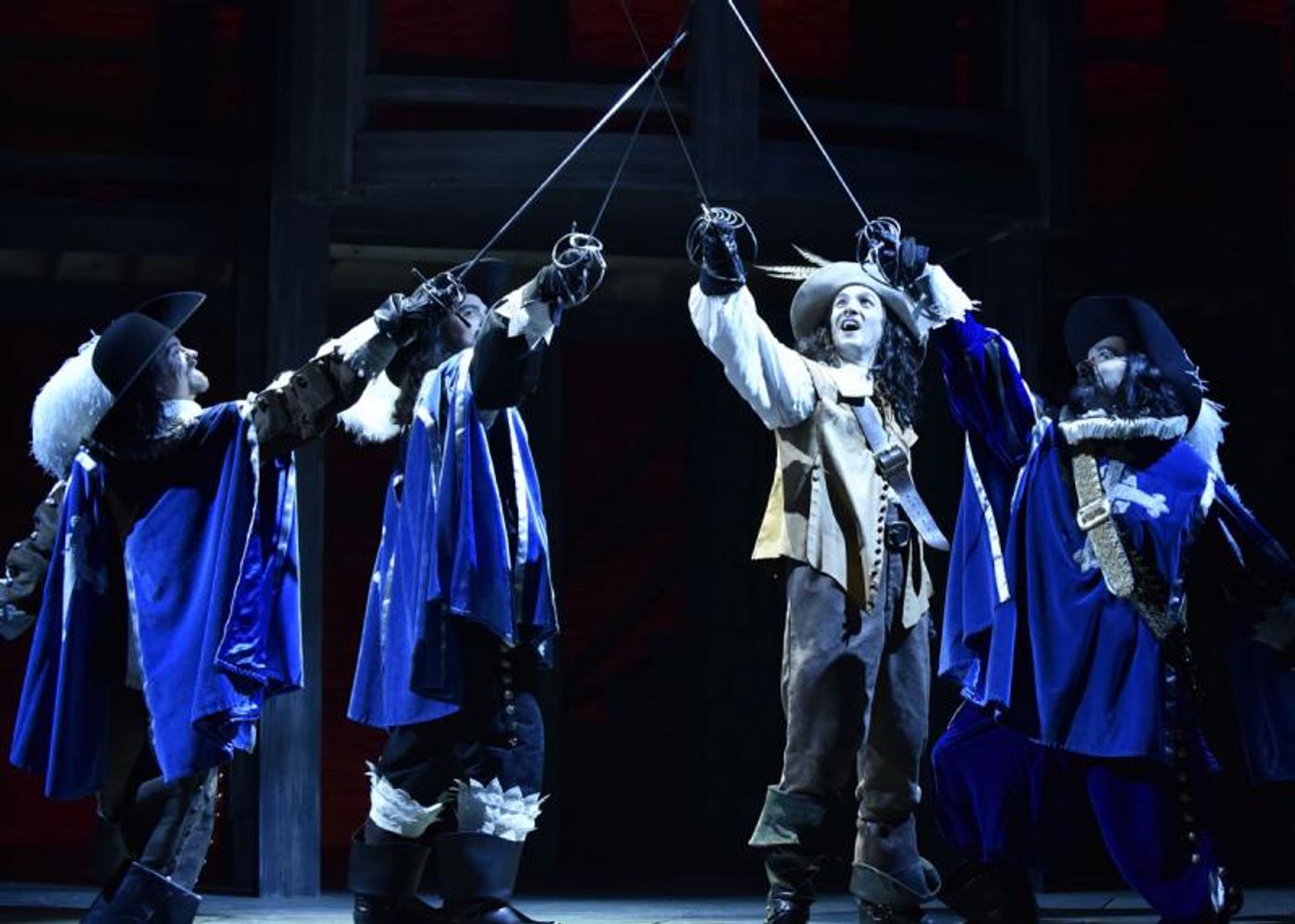
Those familiar with the story will recognize right away just how quickly this piece gets down to business. For the uninitiated, the story is as follows: Young D'Artagnan has newly arrived in Paris with the intent to join the king's Musketeers. His brashness leads to an altercation with the Comte de Rochefort (Jim Ireland), who steals and destroys the Letter of Introduction he'd need to gain even consideration into The Musketeers. However, D'Artagnan still presents himself to Monsieur de Treville (Philip Nolen), intent on proving his worth at all costs. Treville has his own problems, as three of his Musketeers - Athos, Porthos, and Aramis - have had altercations with the guards, under command of the iron-fisted Cardinal Richelieu (Anne Hering). Cardinal enlists the help of Rochefort and Milady de Winter (Tracie Lane) to sabotage the marriage of King Louis XIII (Ben Cohen) and Queen Anne (Samantha Potak), by stealing diamonds from a necklace Anne has given to her lover, the Duke of Buckingham (Cameron Gray). Should this affair be exposed, it may start a war with England that would ultimately put the Cardinal on the throne.
With a lot of characters to keep up with, it's best to focus on the most central figure of both the play and the novel: young D'Artagnan, as played by Orlando Shakes newcomer Benjamin Bonenfant. A regular in the Colorado theatre scene, Bonenfant fills the boots nicely, offering up a portrayal that shows true growth for the brash young boy from the country he plays. He brings a sense of want to the role, giving us a D'Artagnan less intent on the glory of being a Musketeer, but more invested in the honorable duty that it requires. Eschewing even the historical baggage that comes with the 1844 adventure novel, D'Artagnan's arc in THE THREE MUSKETEERS celebrates the merits of one's self over their class, allowing someone to rise above their upbringing because of the virtue of their character, and receiving a just reward for their valiant actions.
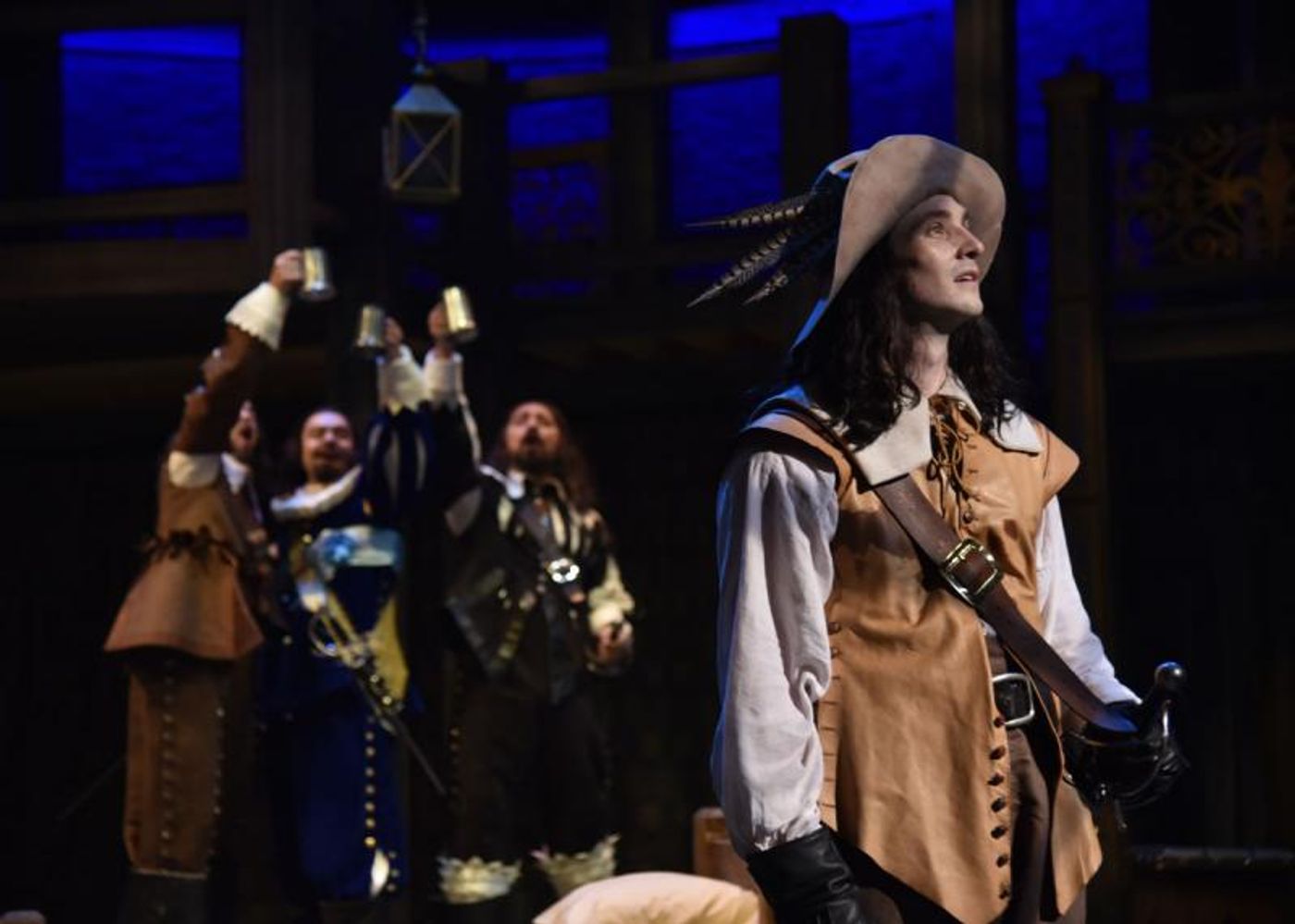
It's this arc that gets the lion's share of development in Catherine Bush's swift and stylized adaptation of the Dumas novel, whittling down seven hundred pages and sixty-seven chapters of wordy exposition into a thrifty two-act piece that emphasizes the characters over the spectacle. Bush's adaptation first debuted in 2015 at the Barter Theatre in Abington, VA, with other regional productions taking off around the country since. Her approach to the material is one that, while traditionally as engaging as the Three Musketeers novel, also has a 21st century sensibility and meta-recognition of some of the more ridiculous aspects of both the original Dumas novel and the variety of adaptations it's been subject to over the years.
Bush's play also imbues a lot of comedy into the story, several moments keep the tongue firmly in cheek as we marvel at narrative choices we've just grown to accept over the years. "Is this supposed to be funny?" my seatmate asked me early on. "Not usually, but at least they're doing it the right way," I whispered back. For example, it makes no sense for D'Artagnan to immediately fall in love with Constance Bonacieux (Lauren Culver). His self-aware declaration of "I'm in love with you" is met with laughs, as it should be, since nothing within that first ten seconds of meeting justifies this action. And yet, the doomed love of D'Artagnan and Constance is one of the cornerstones of Dumas' tale. Bonenfant and Culver play it straight, even if the dialogue suggests that even the characters find their newfound love a bit absurd.
Likewise, the doomed love between Queen Anne and the Duke of Buckingham gets lampooned by way of classical music. Orlando Shakes uses several pieces of classical music in the play to help set the mood, but the one that struck me most was the first movement of Antonio Vivaldi's "Summer," as it accompanies the first scene between the Queen and the Duke. Although the first movements of Vivaldi's other Four Seasons are meant to begin fast and cheerful, "Summer" instead has an atypical somber start, allegro non molto. Such a musical choice predicts the fate of their starcrossed love, especially when one would have jumped at the chance to play any of the movements from "Winter," given the name of one of the antagonists in this company of players.
Perhaps the most comedic use of classical pieces comes from a battle between The Musketeers and the Cardinal's guards. Rather than pick a frenetic piece that emulates the bravado of these swordsmen, we hear the slow, lilting waltz of Johann Strauss' "Blue Danube." It turns this choreographed fight from a display of machismo to a well-timed, well-rehearsed, and wonderfully subversive ballet as the men strike each other down with precision and grace. A lot of THE THREE MUSKETEERS looks towards going back to basics with the story, but giving us these 21st century revisions that make us better appreciate how we view theatrical entertainment over time.
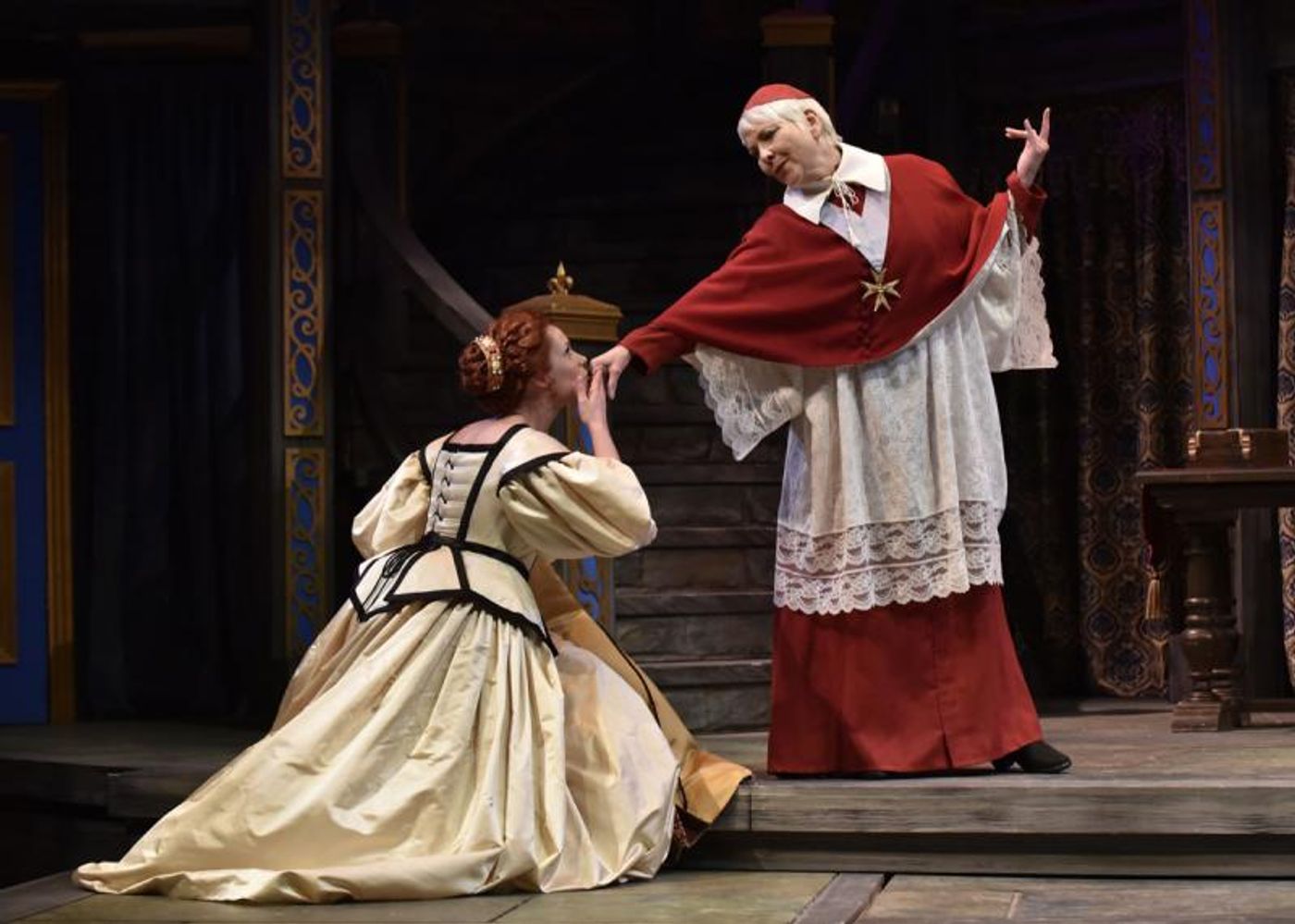
The most surprising of revisions comes with the casting of Anne Hering as Cardinal Richelieu, essentially the real ruler of France thanks in part to her influence over the church and the otherwise foppish King Louis XIII. Hering relishes in the role, imbuing a new dynamic into the Cardinal that give the women of the play a true ownership of their power over men. Whereas the traditional novel only gives Milady de Winter any agency of her own to act, it turns Anne and Constance into pawns of a greater scheme at play. By giving de Winter an equal through Hering's female Richelieu, Orlando Shakes' production now invites a new reading of who's holding the proverbial strings, reminding us of the more modern adage "Behind every great man is a great woman," regardless which side of the fight these people are on. This move turns Richelieu into a more formidable foe for The Musketeers, whilst still placing her very much in the King's favor.
THE THREE MUSKETEERS also looks towards tearing down some of the more traditional masculinity of the novel when, in the second act, the often-comical second banana of Planchet (Brandon Roberts) commands a fight scene all his own. D'Artagnan and The Musketeers look on awestruck as he, singlehandedly, takes down Richelieu's guards without needing any assistance from them. Changes like these help separate THE THREE MUSKETEERS from its contemporary cinematic misfires. We didn't need zeppelins, we just needed good storytelling. Orlando Shakes wisely chose to pick a brand-new adaptation by Catherine Bush that combines the good storytelling of Dumas' timeless work with the modern sensibilities an audience can enjoy today.
Adding to the enjoyment of the story, Orlando Shakes' production offers top notch production design by Bert Scott, who utilizes a rotating stage that moves a stairway in front of or behind the players as necessary, while the floor occasional opens up to give us a desk or a bed as needed. This uneven ground also allows for the swordplay to feel more climactic, especially at one point when a duel between D'Artagnan and Rochefort takes place while the stage rotates. The swordplay, too, deserves mention, as the stage fencing has a flourish and rhythm all its own that come together wonderfully under the choreography of Joy Andersen. Bringing this adaptation together to Orlando Shakes is director Jim Helsinger, a veteran who is twenty-seven seasons strong at the theatre. Helsinger's helmed many of Orlando Shakes' productions; speaking personally, his work first came on my radar with the theatre's 2015 production of Monty Python's Spamalot.
Of course, among my accolades for the technical and narrative strides of this production, I should also make note of the actors. For me, the aforementioned Bonenfant and Hering are standouts among the performers, as they provide just the right balance of straighforward pathos amidst the more comical antics of their co-stars. And, of course, the three titular Musketeers are brought to life by Timothy Williams, Rodney Lizcano, and Walter Kmiec, who collectively give a believable and endearing chemistry that makes us see them as old friends that's torn down many taverns before tonight. The rest of the company consist of seasoned pros - reliable theatre stalwarts like Jim Ireland and Philip Nolen - and a class of relative newcomers to the Orlando theatre scene, who I always love to see grow and develop over time. Three such newcomers: Johnathan Arvelo, Brandy Bell, and Ben Cohen, even host an introductory film before the play starts, allowing us a brief inside look at the production and a tease for what the future season at Orlando Shakes has to offer.
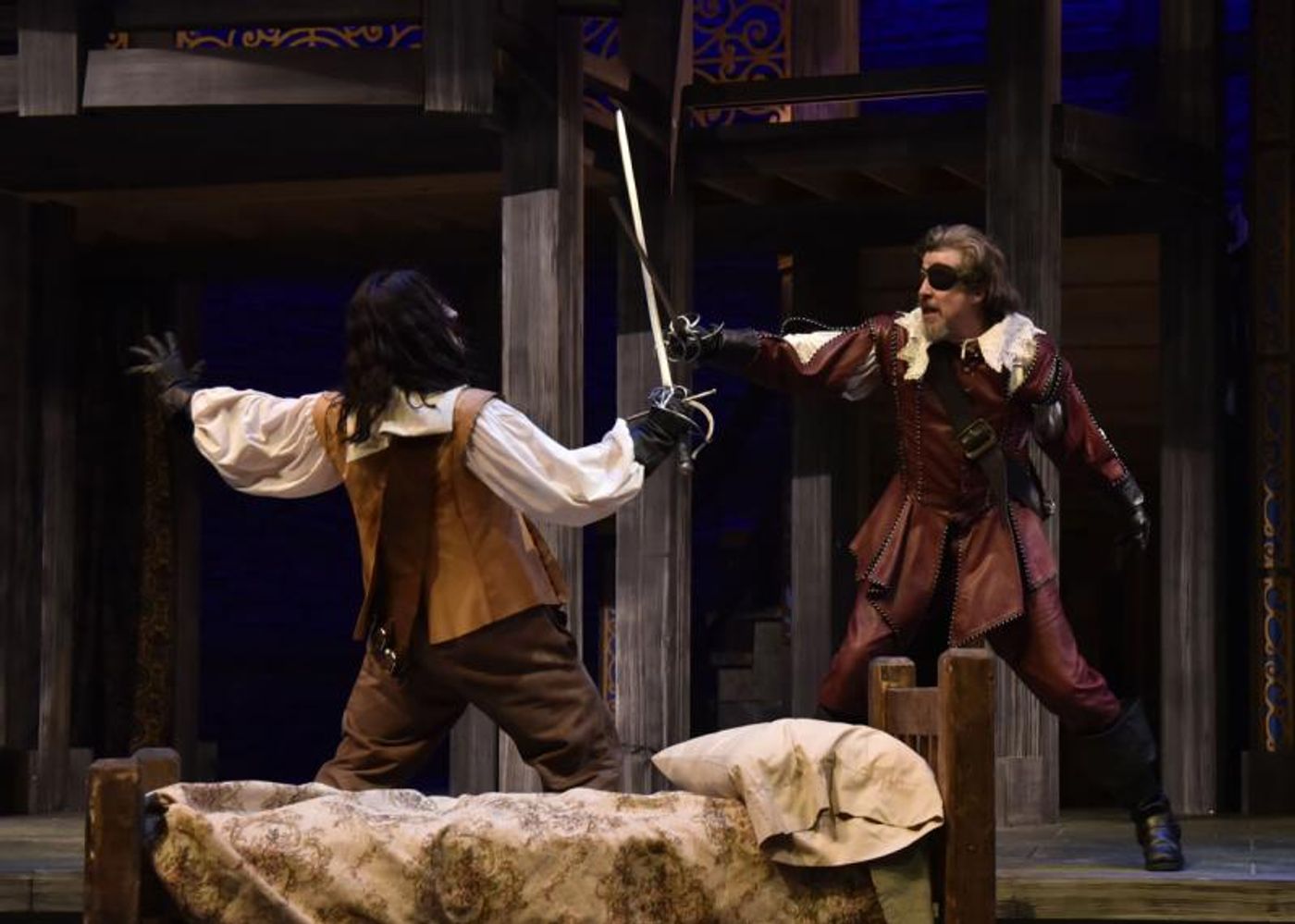
THE THREE MUSKETEERS runs now through March 22. Tickets can be purchased online through www.orlandoshakes.org
Photo Credits by Tony Firriolo, used with permission.
Reader Reviews
Videos

